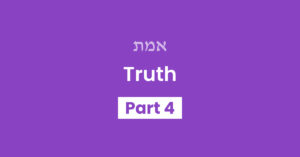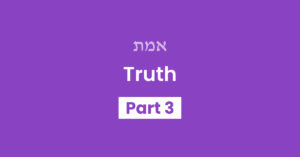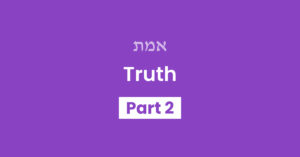We have just entered the Hebrew month of Shevat. The first of Shevat is a very special date in the Jewish calendar, because 40 years after the Jews left Egypt, on 1 Shevat, Moshe Rabbeinu began teaching the Torah in depth to the Jewish people.1
As we all know, the Torah is called “Toras Emes” – a Torah of truth. Hashem, too, is known as “Emes,” as it says, “Hashem’s signature is Emes (Truth).”2 In fact, Hashem cares so much about truth that He cannot tolerate people who are entrenched in falsehood; Chazal teach that anyone who has the habit of lying will not be able to enjoy Hashem’s Presence in the Next World.3
Why is Emes so important to Hashem? And what does it mean that Hashem’s signature is “Truth”? This month, we will take a look at the middah of Emes and try to understand how we can develop this middah on a deep level.
A Dangerous and Destructive Habit
In describing the prohibition of lying, the Torah warns us: “Mi’dvar Sheker Tirchak –Stay far away from falsehood.”4 The Torah wasn’t satisfied with simply saying, “avoid falsehood”; rather, we are warned to stay “far away”! Just as you would warn your friend to “stay far away” from a hidden pile of dynamite because the danger is so great, the Torah warns us to “stay far away” from falsehood because lying is such a destructive habit.5
“Mi’dvar Sheker Tirchak –Stay far away from falsehood.”
Why is falsehood so destructive? On the most basic level, lying is destructive because it can ruin someone’s reputation or cause someone harm.
For example, imagine that Reuven is the owner of a bookstore in Chicago, and there is another bookstore in town (Goldberg’s) that is his competition. One day, Reuven is walking down the street when a stranger approaches him. “Do you know where I can buy books around here?” he asks. “I heard about Goldberg’s – do they have fair prices there?”
Even if Reuven knows that Goldberg’s sells at lower prices than he does, Reuven will inevitably be temped to lie and say that Goldberg’s prices are too high, because Reuven wants his own store to be known as the best in town. But if Reuven says these words of falsehood, he will be ruining Goldberg’s reputation.
Another way that falsehood can be destructive is when we make things up instead of admitting that we don’t know. When someone asks us a halachic question (“What brachah should I make on this food?”) – do we make up an answer, or do we admit that we don’t know? If we are too embarrassed to admit we don’t know, we can easily cause another person to transgress halacha by giving them misinformation.
Truth and Trust
Even when a lie seems relatively innocuous, it can still cause harm in a more subtle way, by ruining people’s trust.
Imagine that 14-year old Eli’s job is to sweep the floors in his house every Thursday. One week, Eli forgets to do it. On Friday, Eli’s mother asks if he did his chores this week. “Yeah, sure, Ima,” he says. “I did everything!”
Ten minutes later, Eli hears his mother’s voice coming from the kitchen. “Eli, what’s this on the floor?” She asks. “Aren’t these the cheerios that Shira spilled yesterday? How come they’re still on the floor, if you already swept?”
Now that the truth is revealed, Eli lost his mother’s trust. Next time she asks whether Eli did his chores, she’s going to be wondering whether he’s really telling her the truth.
For this reason, Emes (truth – אמת) and Emunah (trust – אמונה) share the same Hebrew root6 (א-מ-נ). The more we speak the truth, the more we become trustworthy people.7
The more we speak the truth, the more we become trustworthy people.
This quality of being true and trustworthy is especially important for us as Jews, because it is the basis of our Emunah. Every Jew’s belief is based on trusting his parents and teachers who told him that Hashem gave us the Torah. These parents and teachers trusted their own parents and teachers, who trusted their own parents and teachers, and so on, in a chain of trust leading all the way back to the Jews who stood at Har Sinai.
Loving the Truth
Sometimes we are tempted to lie intentionally, but other times, we fail to tell the truth simply from carelessness.
For example, imagine you are on the phone at work, and one of your co-workers asks when you will be off, because they really need to ask you something. “I’ll be off in five minutes” you tell her, while your hand is covering the receiver. In truth, you know this phone call will take at least another 10 minutes to complete, but you can’t be bothered to give your colleague a more accurate estimation.
While it might not seem like the biggest deal at the time, it’s important to train ourselves to speak as accurately as possible, in order to train ourselves to love the truth. The Sifsei Chaim [8] writes that just as there are some people who love to lie, we have to become people who love the truth.
We have to become people who love the truth.
For this reason, in the Lithuanian city of Kelm (home to the famed yeshiva devoted to Mussar), the Jews were very careful that everything they said was 100% true. Whenever they were asked, “What time is it?” they would answer with the exact time (e.g. 7:36 PM) instead of the approximate time (7:30). Even though the person asking probably didn’t care what exact minute it was, the Jews of Kelm wanted to strengthen their love of Emes, making sure to only say words that were 100% accurate.
This week, let’s make an extra effort to be aware of our words and make sure they are all true. This will help us stick to the middah of Emes, which is so important to Hashem, and it will also help us become even more trustworthy people.
Sources: [1] Devarim 1:2; [2] Shabbos 55a; [3] Sotah 42a; [4] Shemos 23:7; [5] See Sifsei Chaim Middos 1 pg. 19; [6] See Ibn Ezra on Bereishis 24:49 and Ramban on Bereishis 32:11; [7] See Orchos Tzaddikim: Shaar HaEmes; [8] Sifsei Chaim, ibid.
Your Challenge
Choose 1 hour a day when you will be careful to speak only the truth. (It does not have to be the same hour each day.)
At the beginning of the hour, say (or whisper) to yourself: “For the next hour, I will be careful to say only words of Emes.”
FOR EXAMPLE
- No exaggerations.
- No made-up stories.
- If you don’t know how to answer someone, say “I don’t know” or “I’m not sure.”
- When someone asks a question, try to answer as accurately as possible.
Please Note: There are certain situations where the halachah allows – and even requires – us to avoid saying the truth. If you suspect that saying the truth in a certain situation might harm yourself or another person, please consult with a Rav about what to do.
Torah Questions
- When was Yaakov Avinu worried about saying something untruthful? (See Bereishis 27)
- Even though it seemed like Yaakov was lying, Rashi explains that Yaakov actually said true words. How can Yaakov’s words be interpreted as the truth?
- According to Pirkei Avos 5:7, the willingness to admit the truth is one of 7 qualities belonging to what type of person?
- When was Hashem willing to admit the truth – that a certain group of people was right? (See Bamidbar 27)
- According to Brachos 5b, what does “Emes” refer to in the passuk, “Purchase Emes and do not sell it” (Mishlei 23:23)?
- What praise does the Gemara say about a judge who judges truthfully? (Shabbos 10a)
- At one point in history, the Anshei Knesses HaGedolah fasted for 3 days, asking Hashem to hand over the Yetzer hara to them. Finally, a note fell down from the Heavens with the word “Emes.” Rabbi Chanina said: “This teaches that Hashem’s ____ is Emes.”
Questions to Ponder
- Is it always the right thing to say the truth? What are some situations where Hashem might want us to say things that are not fully true?
- Is Emes a quality that applies only to our speech? How might the quality of “truth” apply to our actions as well?
- The Midrash explains that when Hashem was planning to create Adam, some angels protested. The “Chessed” group of angels said: “Create man, because he does acts of kindness!” But the “Emes” group said: “Don’t create man, because he is full of lies.” If it’s true that man often tells lies, how did the “Chessed” group win the argument? And why are Chessed and Emes considered opposite groups – wouldn’t you think the opposite groups should be Emes and Sheker, or Chessed and Cruelty?
- The Midrash writes that “chessed” refers to Aharon, and “Emes” refers to Moshe. Why do you think Aharon matches to chessed and Moshe matches to Emes? Why isn’t it vice versa?





